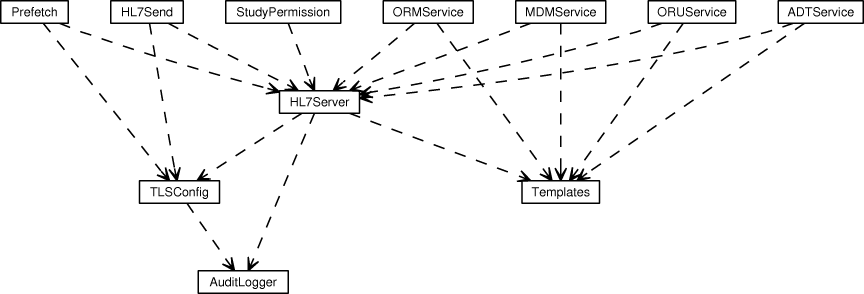HL7 Server
Description
HL7 Server: Dispatch incoming HL7 messages to registered HL7 services. When configuring, select the TCP listening port, the security protocol for communication, timeouts, and the maximum number of connected HL7 senders.
Dependencies
Attributes
#CharsetName
Specifies Charset of incoming and outgoing HL7 messages by its name as listed in the IANA Charset Registry (e.g. ISO-8859-1).
Default Value: ISO-8859-1
#Port
TCP listening port. This is the most important value in the service.
Default Value: 2575
#LocalAddress
Local interface IP address to listen for TCP communication. 0.0.0.0 indicates all active interfaces.
Default Value: 0.0.0.0
#ProtocolName
Enable Transport Security Layer (TLS) mode:
mllp- plain Minimal Lower Level Protocol; no TLSmllp-tls- accept TLS connections; offer AES or DES encryptionmllp-tls.aes- accept TLS connections; force AES or DES encryptionmllp-tls.3des- accept TLS connections; force DES encryptionmllp-tls.nodes- accept TLS connections without encryption
Default Value: mllp
#SoTimeout
Socket timeout in ms. 0 = no timeout. This value determines how long the server is waiting for receiving the next message on an open connection before it closes the idle connection.
![]() HL7 senders typically keeps the connection open between emitted messages, and some interprets a close of the idle connection by the server as serious system failure. So the timeout may be set to a quite large value. Default: 600000 (=10min).
HL7 senders typically keeps the connection open between emitted messages, and some interprets a close of the idle connection by the server as serious system failure. So the timeout may be set to a quite large value. Default: 600000 (=10min).
Default Value: 600000
#NoopMessageTypes
Comma separated list of Message Types which are accepted even if no HL7 Service is registered to actual process the message. By setting this value, you avoid to reject messages, which are not processed by the application.
Default Value: ADT^A02,ADT^A03,ADT^A06,ADT^A07,ADT^A12,ADT^A13
#SuppressErrorResponse
Activates suppression of Application Reject or Application Error as acknowledgment code but always returns acknowledgment code AA (=Application Accept), even if the processing of the message fails.
Default Value: false
#SendNotification
Activates notification of registered listeners about received HL7 messages. Required for message forwarding by #HL7 Send Service and for prefetch of studies on receive of ORM^O01 messages by the #Prefetch Service.
Default Value: true
#FileReceivedHL7
Activates writing received HL7 messages into file (format: hl7-######.hl7, with ###### as the sequence number of the received message since last application start)) in log directory. Useful to analyse HL7 encoding errors in incoming messages, which causes the conversion of the message to XML for further processing to fail.
Default Value: false
#FileReceivedHL7OnError
Activates writing received HL7 messages, which were rejected or which processing failed, into file (format: hl7-######.hl7, with ###### as the sequence number of the received message since last application start) in directory specified by #ErrorLogDirectory.
Default Value: false
#ErrorLogDirectory
Directory to which HL7 messages which are rejected or which processing fails are filed. Only effective if #FileReceivedHL7OnError = true.
A relative path name is resolved relative to archive-install-directory/server/default/.
Default Value: log/hl7err
#FileReceivedHL7AsXML
Activates writing received and XMLized HL7 messages into file (format: hl7-######.xml, with ###### as the sequence number of the received message since last application start) in log directory. Useful to test customized XSL stylesheets used by individual HL7 Services.
Default Value: false
#TcpNoDelay
Send packets as quickly as possible (Disable Nagle's algorithmn). This should increase performance on a Windows operating system.
Default Value: true
#SendBufferSize
Buffer size used for socket output. 0 = use platform default.
Default Value: 0
#ReceiveBufferSize
Buffer size used for socket input. 0 = use platform default.
Default Value: 0
#MaxClients
Maximal number of simultaneously connected HL7 senders.
Default Value: 50
#NumClients
Current number of connected HL7 senders.
#MaxIdleThreads
Maximal number of idle threads.
Default Value: 5
#NumIdleThread
Current number of idle threads.
#NumberOfReceivedMessages
Number of received HL7 messages since last restart of the application. Used for naming of log files, if logging of incoming HL7 messages is activated by #FileReceivedHL7 or #FileReceivedHL7AsXML.
#AckStylesheet
Stylesheet for generated ACK messages.
A relative path name is resolved relative to archive-install-directory/server/default/.
Default Value: conf/dcm4chee-hl7/msh2ack.xsl
#LogStylesheet
Stylesheet for logging of received HL7 messages.
A relative path name is resolved relative to archive-install-directory/server/default/.
Default Value: conf/dcm4chee-hl7/logmsg.xsl
#PreprocessTemplateDir
Directory where template file(s) are located to preprocess the received HL7 message.
A stylesheet can be message type specific ("preprocess_<MSG Type>^<Event Type>.xsl" or "preprocess_<MSG Type>.xsl") or generic "preprocess.xsl" and placed in this directory or in a sub-directory to select a style sheet according to the sender.
This sub-directory can be <IPAddr>, <hostname> or '<Sending Application>^<Sending Facility>' (In this order).
(See also UseHostSubdirs attribute in HL7Server service to enable IP/hostname selection)
A relative path name is resolved relative to archive-install-directory/server/default/.
Default Value: conf/dcm4chee-hl7
#UseHostSubdirs
Enable selection of style sheets depending on IP address/hostname.
If disabled, only Sending Application and Sending Facility can be used to select style sheet depending on message sender but eliminates need of DNS lookup to get hostname.
Default Value: false
#TLSConfigName
Used internally - do NOT modify.
Default Value: dcm4chee.archive:service=TLSConfig
#AuditLoggerName
Used internally - do NOT modify.
Default Value: dcm4chee.archive:service=AuditLogger
#TemplatesServiceName
Used internally. Do NOT modify.
Default Value: dcm4chee.archive:service=Templates
#Name
The class name of the MBean
#State
The status of the MBean
#StateString
The status of the MBean in text form
Operations
#create
Standard MBean lifecycle method
#start
The start lifecycle operation
#stop
The stop lifecycle operation
#destroy
The destroy lifecycle operation
#jbossInternalLifecycle
The detyped lifecycle operation (for internal use only)
#registerService
Register HL7 Service
